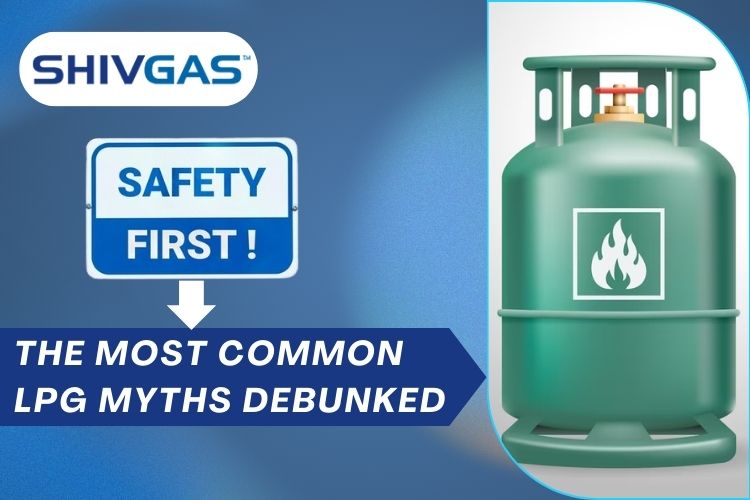
How safe is your LPG cylinder? Have you thought about LPG safety? If you are like any of us, you have likely been told some terrible things about LPG such as the fact that cylinders can explode or that leaks are invisible. These misunderstandings can cause untimely panic and occasionally unsafe behaviour. But how much of what you hear is genuinely true?
To a large extent, the danger of the LPG is just a mirage that comes along if the fuel is handled recklessly. However, there are so many myths surrounding the use of LPG making, but don’t worry – it sounds more dangerous than it actually is.
If you can conclude these myths as false, then you will not only feel safer when using LPG but will also be armed with appropriate safety measures when using LPG in your home. Let’s dispel common LPG myths and get down to facts!
An LPG myth that is rife in the market is that LPG cylinders are prone to explode under any minimal provocation. This is far from reality. LPG cylinders are high-pressure vessels and they undergo several tests and checks to ensure that they come to your home safely. It is virtually impossible to have a cylinder blow up when everything is working well.
Explosion risk is usually associated with improper use, refill, or with safety valve modification. On the contrary, LPG cylinder accidents are mostly caused by a leakage of gas that goes unnoticed until a mishap occurs. You should avoid these cases by observing the appropriate measures on the LPG cylinder safety.
You should never put a flame on your gas line in any way, shape or form to try to detect whether there is a leak. There are those who think that if one sways a match near the valve one can be able to tell whether the car has a leak or not. Not only is this untrue but also highly dangerous.
However, it is recommended that one uses a solution of soap and water only. Use it on the ostensibly involved area, for example around the valve or connection and wait to see the formation of bubbles. In the case where bubbles form then it means that there is a leak. Switch off the cylinder concerned and contact your LPG suppliers for help.
This myth is partially true. Well, honestly, LPG is heavier than air, but it does not just stay around for a very long time like some people would have you believe. LPG can sink to the floor of a room provided the room is enclosed and poorly ventilated. But if the LPG is allowed to circulate freely, it will evaporate on its own thus minimising chances of building up and igniting.
It is important to note that not all hoses and regulators in the market are manufactured to the same quality. Many people seem to think that they can interchange any hose or regulator with an LPG cylinder, but this is a disaster waiting to happen. Every cylinder needs a regulator that should be of the pressure equivalent of the cylinder, and using the wrong one leads to leakage or non-functioning appliances.
This means that you should always use regulators and hoses that bear an ISI mark and should only be used with LPG.
A number of people have a perception that LPG is colourless and smells nothing, hence issues of leakage are undetectable. As it is, pure LPG does not have any smell but gas companies put a chemical known as ethyl mercaptan into LPG to give it the fiery stench of rotten eggs. This makes it possible for anyone to notice any leakage in the system just by the smell even if the leakage is a small one.
That is why it is important to understand how LPG smells, and what LPG safety tips one needs to take if he or she discerns it. All the windows and doors should be opened for ventilation, should not switch on any flame or electrical switches and should call a professional as soon as possible.
You May Read: Safety Tips for Installation of LPG Cylinder
People have many misconceptions about LPG but learning more about LPG safety will help you to steer clear of undue alarm and see to it that your home stays secure. Starting from the fact that LPG cylinders go through a lot of tests before being sold in the market to embracing the proper way of checking for leakage it is evident that using LPG is all about correct practices. Do not let common myths about LPG influence how you utilise the gas – use the following tips and you will be able to use LPG as a confident and secure tool.
For the best and most secure LPG services, will be able to get from SHIVGAS. SHIVGAS being one of the prominent LPG suppliers in India ensures to deliver quality reinforced LPG cylinders with safety assurance.
LPG is flammable but also an asphyxiant gas. It causes unconsciousness or death depending on the extent to which it displaces oxygen.
LPG vapours can travel some distance along the ground and accumulate in drains or basements. The gas if it comes into contact with a source of ignition can either burn or explode. Cylinders can explode in cases where there is a fire.
SHIVGAS makes sure that all the cylinders supplied have passed through safety checks and have met the quality test. You may need an LPG cylinder soon, want it delivered on time, or have an issue or question about the cylinders, and Shiv Gas has everything you need!
Comment (0)